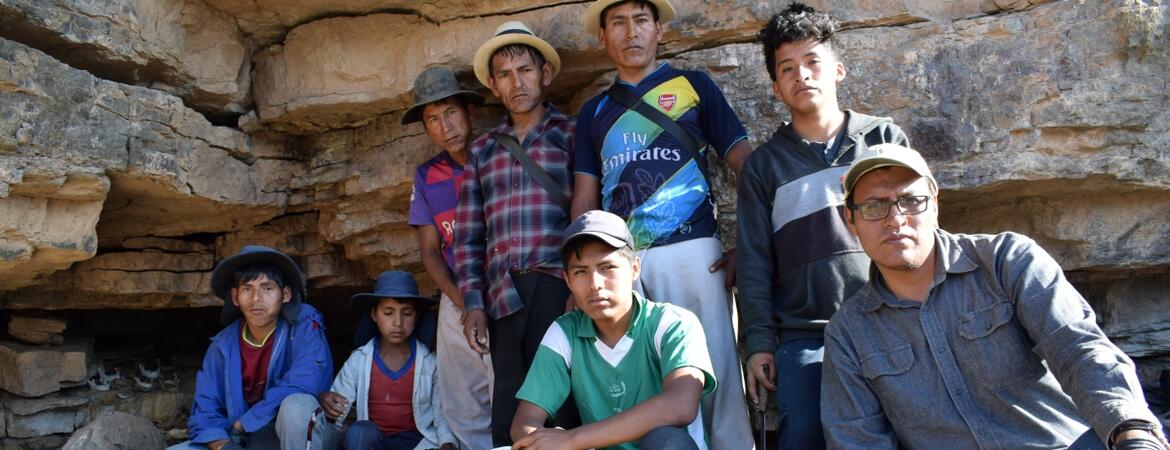College of Humanities, Arts, and Social Sciences

UC Riverside doctoral student Juan Chavez is making strides in biological anthropology through his field research in the Bolivian Andes. As a sixth-year Ph.D. candidate, Chavez was recently awarded a $22,000 Wenner-Gren Dissertation Fieldwork Grant to advance his study of the Mojocoya networks.
“Receiving a Wenner-Gren grant is highly significant for me because it confirms that my work is good enough to be supported and indicates that my scholarship offers some insights to further anthropology from a new perspective,” Chavez said.
According to its grants and fellowships website, the Wenner-Gren grant is considered one of the most competitive grants in anthropology. It funds doctoral or thesis research that advances anthropological knowledge and has a maximum award amount of $25,000.
Motivated by the significance of the grant application, Chavez designed his project to relay the equal importance of the study of archeological materials and making a positive impact on indigenous communities by including transdisciplinary research. According to Chavez, he was also encouraged by his professors at UCR to apply for the grant for the opportunity to gain experience in research design, planning, implementation, and reporting.
The Wenner-Gren grant will support Chavez in adding data to a database he previously created and fieldwork. The grant will also aid his analysis of archaeological samples taken from his upcoming trip to the Bolivian Andes in 2025.
“This is significant because this type of data is minimal in the Bolivian Andes and will contribute to nuanced reconstructions of social dynamics in early pre-Columbian societies,” he said.
Chavez’s dissertation project, titled “A Bioarchaeological Study of Mojocoya Networks in the Eastern Slopes of the Bolivian Andes (AD 600-1100),” explores the pre-Columbian network changes of the Mojocoya, a small-scale Bolivian Andes society, through the study of cultural and skeletal artifacts from mortuary caves. His research utilizes a culturally respectful methodology, focusing on indigenous views of the dead to guide data collection and documentation.
“The results will provide new evidence to reconstruct Mojocoya networks while discussing identity, kinship, and migration in an understudied region,” Chavez said. “This is important because my study of networks in the pre-Columbian Andes will provide a case study of non-state societies working as strategic network-building organizations in South American and world prehistory.”
Chavez's commitment to his research stems from his personal and cultural responsibility as a member of the Aymara, an indigenous group native to the Andes in South America. He seeks to continue reconstructing and sharing indigenous ancestral stories in today’s world.
“I have been doing this for more than a decade in collaboration with American and Bolivian scholars in the Andes, Amazonia, and Gran Chaco regions of Bolivia,” he said.
As he continues his research, Chavez faces one challenge in navigating between bioarchaeology methodologies and indigenous knowledge, specifically within the perception and treatment of archaeological human remains. “I am the first indigenous bioarchaeologist from Bolivia and often find myself in the middle of ethical and methodological debates on the nature of human bodies as either artifacts or people,” he said.
With the support of the Wenner-Gren grant, Chavez plans to refine his methods in data collection, analysis, and management to place these remains within their social contexts, he said. By doing so, Chavez hopes to develop a culturally respectful methodology.
For Chavez, completing his dissertation is only the first step in his career in bioarchaeology research at an R1 university, a Carnegie classification given to UCR for its high priority in supporting and conducting research. Chavez’s dissertation is also the starting point for a new long-term, multi-site research project, “Proyecto Arqueológico Redes y Migración en los Andes de Bolivia (PARMAB),” in which he aims to understand the community formation, local organization, and more of past social groups in the Eastern Slopes of the Bolivian Andes.
“I will continue working in the Andes, my ancestral homeland, and collaborate with indigenous communities to develop alternative strategies for improving their lives while uncovering our ancestors' stories,” he said.
FEATURED PHOTO. Juan Chavez (pictured right) with Palajla Baja indigenous community members in front of a mortuary cave.